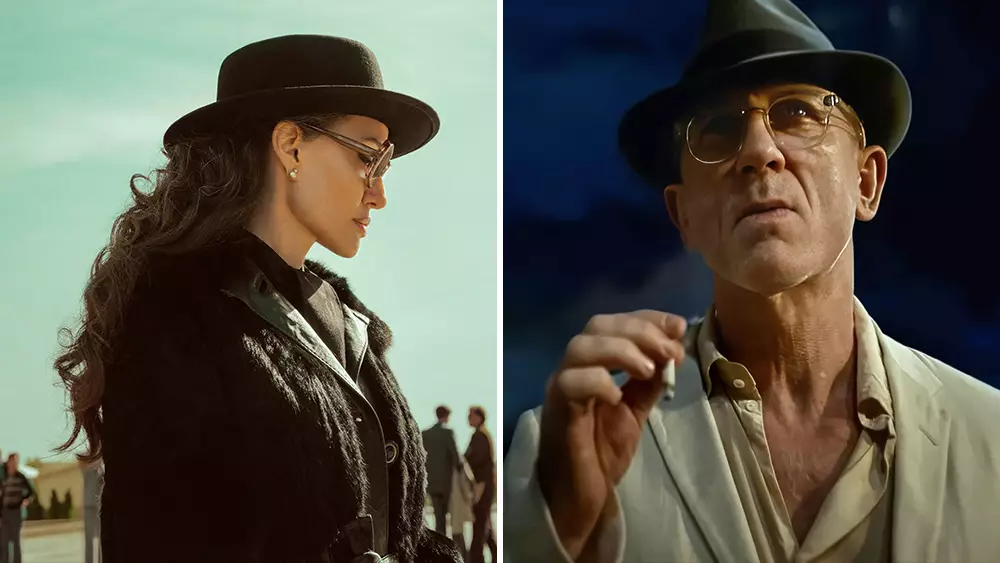The extended U.S. Thanksgiving weekend is a particularly significant time in the film industry, as it often marks one of the busiest periods at the box office. During this time, independent films strive to carve a niche alongside bigger studio productions. Three noteworthy films recently premiered—Luca Guadagnino’s *Queer*, Angelina Jolie’s portrayal of Maria Callas in Pablo Larraín’s *Maria*, and Mohammad Rasoulof’s *The Seed of the Sacred Fig*. Each of these films brings a unique flavor to the cinematic landscape, navigating the waters of critical acclaim and audience reception amidst stiff competition from mainstream hits.
*Queer*, a film adaptation of William S. Burroughs’ work, has been creating ripples in art-house cinema since its limited release. Daniel Craig stars as William Lee, a character steeped in loneliness while living expat life in Mexico City. Critics have noted Craig’s performance as “nailing the sardonic spirit” of Burroughs—a notable accomplishment given that the source material was penned in the 1950s but not published until the mid-1980s.
The film’s narrative centers around Lee’s unexpected relationship with Eugene Allerton, a student who prompts him to reconsider his solitary existence. The film’s limited release in major cities like New York and Los Angeles has placed it in direct competition with large-scale productions like *Moana 2*. Yet, *Queer’s* nuanced storytelling and character development provide an intriguing counterpoint, suggesting that there is still a significant audience for indie films that explore deep emotional and intellectual landscapes. In a season often dominated by escapist blockbusters, films like *Queer* are essential for those seeking more layered content.
Mohammad Rasoulof’s *The Seed of the Sacred Fig* adds a strong political undertone to the Thanksgiving film lineup. The film navigates modern Iran’s complex cultural landscape through the lens of a middle-class family facing internal and external turmoil. The daughters’ dissent against their father’s complicity with a repressive government aligns perfectly with the urgent global discussions surrounding personal freedom and political identity.
Rasoulof’s decision to shoot the film secretly in Iran—and his subsequent exile—adds layers of authenticity to the portrayal of conflict and oppression. The accolades garnered by the film at Cannes highlight its powerful storytelling and emotional resonance. As audiences watch the film unfold in select theaters, the heart-wrenching narrative may resonate deeply, providing both a viewing experience reflective of contemporary struggles and a reminder of the importance of courage in the arts. With a strong critical reception, including a 94% rating on Rotten Tomatoes, this film competes for attention amongst the holiday-heavy lineup of commercial releases, challenging viewers to engage with its socially relevant themes.
Angelina Jolie’s portrayal of the legendary opera singer Maria Callas in *Maria* takes viewers on an emotional journey through the complex life of one of music’s most enigmatic figures. The film covers a transformative week in Callas’s life, interspersing present-day struggles with poignant flashbacks. The decision to have Jolie sing—a blend of her own voice with Callas’s—adds a unique interpretation to the biopic genre, pushing the boundaries of how cinema can encapsulate artistic identities.
Pablo Larraín’s direction in *Maria* is especially notable, considering his past films that delve into the lives of iconic women, such as Diana and Jackie Kennedy. The film opens on around 60 screens ahead of its anticipated Netflix release, showcasing a blend of theatrical run and streaming access that reflects contemporary viewing habits. By juxtaposing Callas’s tumultuous experiences with her extraordinary artistry, *Maria* celebrates the complexities of fame and the personal sacrifices made by artists—making it another essential film for audiences craving depth amidst the holiday cinematic offerings.
The Thanksgiving box office isn’t merely a battleground for blockbuster films; it also serves as a stage for independent cinema to shine, albeit under challenging circumstances. While major narratives like *Moana 2* and *Gladiator II* dominate the mainstream scene, the varied themes explored by indie films reveal an industry rich with diversity. With their limited releases, films like *Heavier Trip*, a Finnish comedy about a metal band on a chaotic journey, and *This Search for Meaning*, a documentary on the band Placebo, showcase the breadth of creativity permeating independent film today.
Despite the pressures from Hollywood’s heavyweights, these films find unique ways to resonate with audiences—whether through humor, nostalgia, or radical storytelling. As the box office dynamics evolve, it will be intriguing to see how these indies navigate a market that increasingly favors big-budget offerings, potentially signaling a balance between commercial and independent cinema that continues to thrive for years to come.
